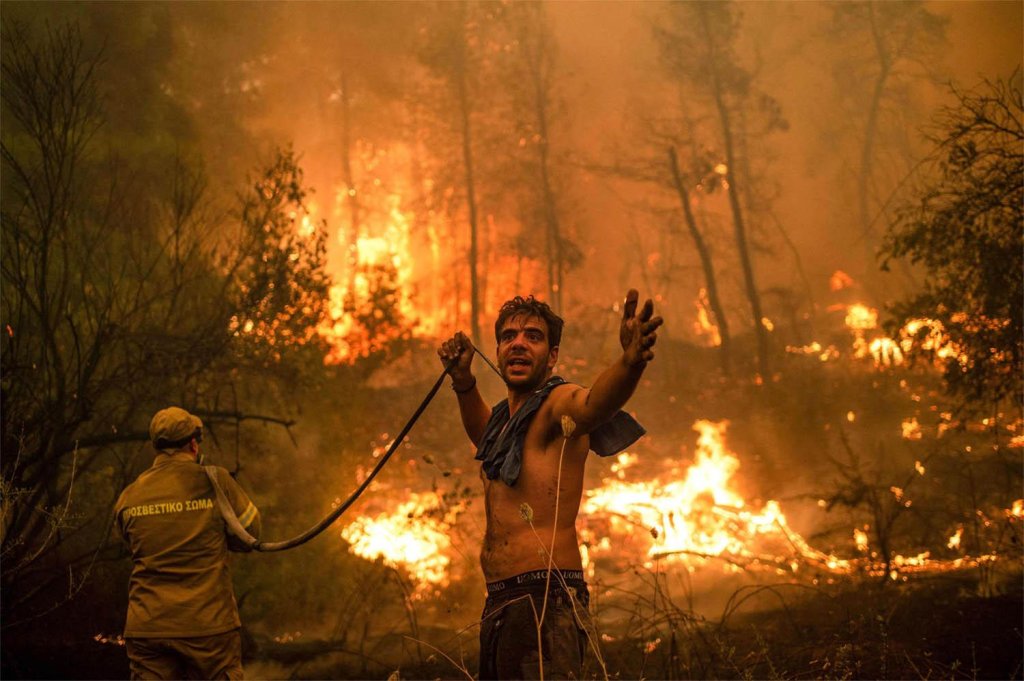The escalating frequency of wildfires in Turkey underlines the urgent need to rethink them not merely as natural disasters but as critical challenges to ecological security. Beyond their immediate devastation, wildfires highlight more profound ecological, economic, and societal vulnerability, demanding a multidimensional and forward-thinking response. The increasing impacts of climate change and the growing threat of wildfires pose a dual challenge to humanity, ecosystems, and nation-states. More specifically, wildfires disrupt human habitats, degrade arable and fertile lands, undermine ecological sustainability, and negatively impact the economic stability of states. For example, in August 2024, a massive fire in Izmir, Turkey, destroyed forests and the future of thousands of species living there. A wildfire renders the soil infertile and prolongs the period required for it to become arable again. It forces species living in forested areas to either lose their lives or abandon their habitats. Intensified by climate change, extreme heat, and drought lead to these forested areas being replaced by shrublands or grasslands. Moreover, combating climate change becomes increasingly challenging as we lose critical carbon sinks. Wildfires, intensified by human-induced climate change, are an undeniable threat.
According to WMO’s State of Global Climate Report 2023, the global average temperature in the January-September period of this year was measured at 1.54 OC above the pre-industrial average, and 2024 is “on track to be the hottest year on record,” with extreme temperatures, heavy rainfall, floods, and tropical cyclones causing massive loss of life and damage. In this context, wildfires, increasing in intensity and impact due to climate change, negatively affect Mediterranean countries. WWF emphasized that almost 90% of wildfires are unfortunately human-caused. According to the General Directorate of Forestry of Turkey, while 1419 forest fires broke out in Turkey between January 1 and August 19 last year (2023), 2,529 fires were recorded in the same period this year, representing an increase of 78 percent. Unfortunately, Turkey’s wildfire toll is deep and rooted. In other words, in the last fifty years, wildfires have tripled in numbers. 2015-2020 witnessed 16.003 wildfires, and 62.315 hectares of forests were damaged. After the wildfires in Antalya and Muğla (2021), thousands of hectares of forest were destroyed, directly affecting the region’s species and causing an economic loss of approximately 232 million dollars for Turkey. However, 2024 has been marked by a series of environmental crises in Turkey, with wildfires taking center stage. For example, the Director General of Forestry of Turkey announced that 3,800 wildfires broke out in Turkey in 2024, and 27 thousand hectares of land were damaged in these fires. Particularly devastating fires in the Mediterranean and Aegean regions have destroyed thousands of hectares of forest, significantly impacting natural ecosystems, human security, the economy, and environmental sustainability. These fires reveal how climate change has begun ecological security issues and human and national security. Moreover, 2024 saw record-breaking heatwaves that rendered Turkey increasingly vulnerable to wildfires. Hence, in August 2024, more than one wildfire occurred in the same period in İzmir, Manisa, Bolu, and Aydın, again causing a massive loss of forests. Compared to the same period in 2023, wildfires increased in terms of numbers and intensity in 2024.
Anthropogenic factors significantly contributed to the increasing frequency and intensity of wildfires. Some fires were deliberately started to clear land for agriculture or urban development, while others resulted from carelessness in fire-prone areas. Still, the growing effects of climate change accelerate the density of wildfires. Given this adverse situation in Turkey and considering that these fires are a reality for us, we must approach them in every aspect that we can think of to win this fight. Environmental disasters such as climate change, floods, and wildfires directly threaten ecosystems and other living species, constituting an ecological security issue.
At that point, Matt McDonald defines ecological security as a discourse that focuses our attention on the long-term resilience of the earth’s ecosystems. In this framework, the increasing effects of climate change can disrupt the resilience of the ecosystem. Currently, wildfires serve as a prominent example of threats to ecosystem resilience. In the example of Turkey, in 2023, a new study analyzed the biodiversity impacts of the fires in Manavgat, Antalya. It revealed that the mega-fires damaged the habitats of many species, including 56 mammal species, as well as caused disruption on the fertile lands and forests, which are the essential elements of humans and other living things for both short-term and long-term. According to the study, almost half of the habitat of species that live in the Aegean and Mediterranean regions was burned. Similarly, the habitat of the rock hyrax (Dryomis laniger), a small mammal species found only in Turkey and mainly in the Mediterranean region, which makes Anatolia unique, was also significantly damaged. However, there are also species with significant habitats among those affected by the Manavgat fire. These include the Egyptian fruit bat (Rousettus aegyptiacus), the Anatolian serotine bat (Eptesicus anatolicus), and the White-banded bat (Pipistrellus kuhlii). Moreover, a fire between Mardin’s Mazıdağı district and Diyarbakır’s Çınar district killed 924 animals. Then, it is significant to stress that wildfires are related to destroying forests and the lands and animals, which are part of the ecosystem. Just as the burning of forests causes significant sink losses in the fight against climate change, soil infertility might cause food security and animal habitats to disappear and disruptions in the natural cycle chain of the ecosystem. Wildfires represent a multifaceted threat, undermining biodiversity and essential ecosystem services crucial for human and environmental well-being.
In this framework, forests are home to countless plant and animal species, many of which are now endangered due to habitat destruction. The affected regions have become “biological deserts,” where soil fertility is depleted, and natural regeneration is stifled. This loss extends beyond environmental concerns and disrupts local livelihoods, particularly those dependent on forestry and agriculture. Ecological security refers to protecting environmental resources and securing these resources for people and nature sustainably. Hence, it suggests the protection and preservation of natural resources in a sustainable way and its relations with humanity and people’s lives. Accordingly, Turkey’s wildfires disrupt natural cycles, destroy ecosystems, and threaten environmental security. The carbon emissions from wildfires accelerate climate change and negatively impact the water cycle and soil fertility. This situation ends up in the desertification of agricultural lands and the depletion of livelihoods for local communities. The destruction of ecosystems to this degree causes an imbalance in environmental processes at the regional and international levels. The devastating wildfires in Turkey emphasize the urgent need to reframe biodiversity conservation as a matter of ecological security. These events highlight the interconnectedness of environmental health, economic stability, and human well-being. A holistic approach that integrates biodiversity protection, climate action, and sustainable development is essential. By doing so, Turkey can mitigate the impacts of wildfires and strengthen the resilience of its ecosystems and communities against future environmental challenges. Besides disrupting the ecological balances, they directly affect economic, social, and international security issues.
In conclusion, wildfire damages should be tackled at the moment of crisis and through proactive policymaking and raising awareness, along with developing technological infrastructure, such as early warning systems. Wildfires should not be perceived only as natural disasters; they should be examined as a broader, multidimensional ecological security matter. This approach suggests protecting ecosystems, supporting economic stability, and increasing societal resilience. Turkey’s forests are a part of our heritage; they are more than just natural resources. We should share responsibility to protect the ecological balance and leave a healthier environment for future generations.

Sezen Kaya-Sönmez, PhD Candidate, Kadir Has University
Sezen Kaya is currently pursuing her Ph.D. in International Relations at Kadir Has University. She has completed undergraduate and graduate degrees in International Relations at Çukurova University. Her research interests focus on environmental security, climate security, climate change, and Copenhagen School.

Ece Doğa Ayan, Kadir Has University
Currently pursuing a Bachelor’s degree in International Relations at Kadir Has University, with a minor in International Law. Engaged in a research project on the comparative analysis of right-wing parties in the European Union and Turkey. Serving as a research assistant for a European Research Council-funded project conducted by the Sant’Anna School of Advanced Studies, contributing to data analysis and evaluation processes. Assisting Prof. Dr. Mustafa Aydın as a student assistant and participating in collaborative academic projects with various international universities.
To cite this work : Sezen Kaya-Sönmez – Ece Doğa Ayan, “From Forests to Futures: Understanding Turkey’s Wildfires as an Ecological Security Challenge”, Panorama, Online, 03 January 2025 ,https://www.uikpanorama.com/blog/2025/01/03/turkey’s-wildfires-ecological-security-sks-eda/
Copyright@PanoramaOnline. All on-line and print rights reserved. Opinions expressed in this work belongs to the author(s) alone, and do not imply endorsement by the IRCT, the Editorial Board or the editors of the Panorama.



